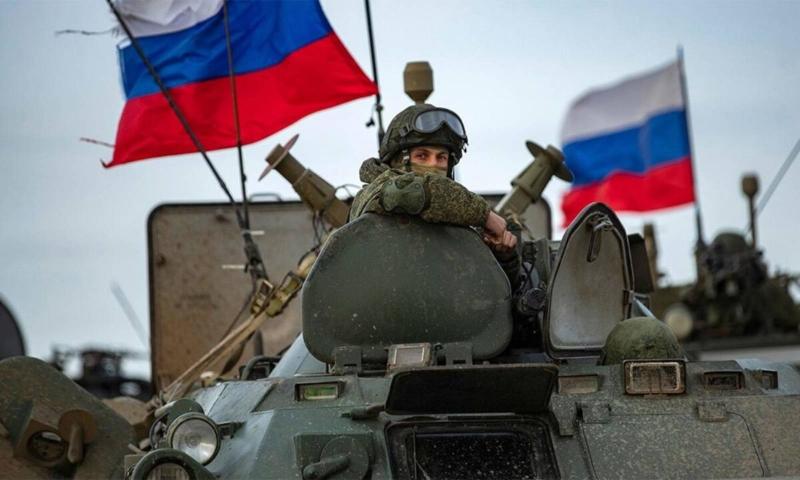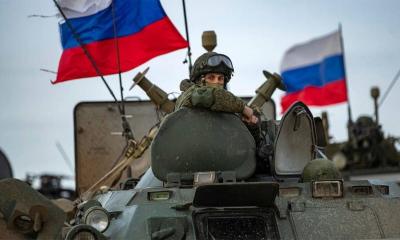Under the title "4 Factors That Will Not Make the Russian Invasion of Ukraine a Walk in the Park," the Alhurra website published a report highlighting that, while Russia continues to amass troops near its border with Ukraine, analysts assert that any Russian military move "will not be easy" as it was in 2014. U.S. intelligence reports indicate an increase in Russian troop movements toward its borders with Ukraine, raising fears of a large-scale invasion of Ukraine anticipated to occur early next year, according to an analysis published by the Brookings Institution.
Western countries are warning Moscow that it will face unprecedented economic sanctions if it proceeds to invade Ukraine. A civil war has been ongoing in eastern Ukraine between Kyiv forces and Russian-backed separatists since 2014, following Moscow's annexation of Crimea, which led to the displacement of more than two million people and the deaths of over 14,000 individuals.
Political analyst Ali Rajab noted in an interview with Alhurra that there are four factors "indicating that any potential Russian military operation against Ukraine will not be a walk in the park as it was in Crimea." The first is that Ukraine currently has a near-state of political stability, unlike in 2014, a stability that supports the Ukrainian armed forces in unifying their decision-making in the face of any Russian military intervention.
The second factor is the strong European position that not only supports Ukraine militarily, politically, economically, and in intelligence but is also driven by European fears that any Russian military operation against Ukraine would signify the start of Russia's reassertion of control over Eastern Europe, posing a threat to all of Europe. Therefore, Ukraine serves as the first line of defense for European countries against any potential conflict with Russia.
The third factor is the role of the United States in supporting Ukraine and Eastern European countries, as well as NATO's stance against any real Russian threats. This was evident, according to Rajab, in statements from the White House, the Pentagon, and the U.S. Congress, suggesting that a military operation against Ukraine could threaten the outbreak of a major war in Eastern Europe.
The fourth factor is the support provided by European countries, NATO, and the United States in arming the Ukrainian army. The Ukrainian army now possesses advanced weaponry from NATO countries to counter any Russian threat, alongside military training and improvements in the military capabilities of the Ukrainian armed forces compared to 2014.
Rajab pointed out that a war breaking out in Eastern Europe by Russia would plunge the Russian and global economy into crisis amid the ongoing challenges posed by the COVID-19 pandemic. Russia could find itself isolated against Europe if such a war breaks out, especially given Europe's threats to halt Russian gas lines and shift towards gas from Eastern Mediterranean countries. This complicates the ability of the traditional Russian economy to withstand a prolonged war in Eastern Europe, jeopardizing the Russian state's capacity to cover the local and international costs of any military action against Ukraine.
"Not an Easy Task"
Political analyst Amer Al-Sbaileh stated in response to Alhurra's inquiries that "Russia will not be able to engage in an overt and direct war with Ukraine." He emphasized that if it were to invade Ukraine, "it would not be an easy task or a walk in the park." He added that since the arrival of the Biden administration, Russia has been trying to gauge its ability to push for international gains, especially after the U.S. withdrawal from Afghanistan.
He indicates that Russia's provocative actions aim to distract American attention and demonstrate that granting Russia international gains is the best way to contain it.
Putin's Logic
Stephen Pifer from the Brookings Institution noted that in 2015, "Germany and France mediated an agreement called Minsk II between Ukrainians and Russians, aimed at resolving the conflict, but unfortunately, it was never implemented. Not even the initial provisions related to the ceasefire or the withdrawal of heavy weapons from the line of contact." He believes that "Moscow wanted to maintain this simmering conflict, using it as leverage against Ukraine and to distract its attention."
He added that what has occurred in recent weeks has unveiled intelligence fears, and much concern has been expressed in Washington and European capitals as the number of Russian troops near Ukraine has increased. Although it may seem like a repetition of past events, this time is more serious, with expectations that the number of Russian soldiers on the border with Ukraine could reach 175,000.
Pifer stresses that "the costs of Russia launching a large military incursion into Ukraine are high, and they must be deterred from doing so. From the Kremlin's perspective, there may be concessions from Kyiv and the West with merely the threat of Russian military force."
He added that "there are many speculations about what will happen between Russia and Ukraine, as Ukraine wants to be closely linked to the West due to Russian policies."
Pifer believes that Russian President Vladimir Putin is likely to resort to deception rather than an actual intention for a real invasion, especially since "Putin has his own logic." However, the West is very alarmed by Russia's actions.
He believes that "Putin has received messages from the West, especially through the phone call he had with Biden, where severe economic sanctions could be imposed on Moscow, and greater flows of military aid could be seen for Ukraine in facing Russia."
Even on the military front, "Ukraine in 2021 is very different from what it was in 2014. It now has tens of thousands of soldiers, meaning what Moscow sees as an easy task is no longer the case," according to Pifer.
He points out the irony that Russia possesses the largest nuclear arsenal in the world and has the largest and most powerful conventional military force in Europe, occupying parts of Ukrainian territory, yet the president demands from Putin security guarantees that NATO will not expand to include countries in the region. Moreover, Putin's security concerns arise from "the possibility of American offensive missiles in Ukraine that could strike Moscow within five minutes."
Pifer recommends continuing "diplomacy to defuse the crisis, though it will be a long and arduous process, rather than discussing what could be the largest ground war in Europe since World War II."
Security Guarantees
Recently, Russia announced that it had delivered to the United States a list of "proposals" including legal guarantees it demands for its threatened security. Yuri Ushakov, a foreign policy advisor to the Kremlin, stated to reporters, "The Russian Foreign Ministry has submitted our concrete proposals to U.S. officials."
He explained that these proposals "aimed at establishing legal guarantees for Russia's security" were specifically delivered to Karen Donfried, the U.S. Assistant Secretary of State for European Affairs, who visited Moscow this week after her visit to Kyiv.
During a video meeting with his Chinese counterpart Xi Jinping, Putin expressed hope that "the Americans and NATO would respond positively to these proposals," according to a Kremlin advisor.
In a video released on Wednesday, Donfried stated that she "will convey these ideas to Washington and share them with U.S. allies and partners." She added that during discussions in Moscow, she expressed her "concern regarding Russia's military build-up near Ukraine," reiterating Washington's commitment to defending "Ukraine's sovereignty and territorial integrity."
Putin called for "immediate" negotiations with NATO and the United States regarding the guarantees he requested from his U.S. counterpart, Joe Biden, in early December.
Russia particularly opposes any expansion of NATO to neighboring countries like Ukraine and seeks legal guarantees that would rule out such a possibility in the future.




